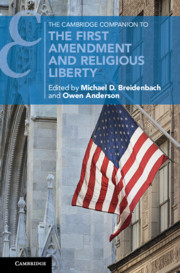Book contents
- The Cambridge Companion to the First Amendment and Religious Liberty
- Cambridge Companions to Law
- The Cambridge Companion to the First Amendment and Religious Liberty
- Copyright page
- Dedication
- Contents
- Notes on Contributors
- Acknowledgments
- Introduction
- Part I Philosophical Foundations
- Part II Historical Interpretations
- 4 Religious Exercise and Establishment in Early America
- 5 The Historical Context of the Religion Clauses of the First Amendment
- 6 Religious Tests, Loyalty Oaths, and the Ecclesiastical Context of the First Amendment
- 7 Church and State in the Nineteenth Century
- 8 The First Amendment Religion Clauses in the United States Supreme Court
- Part III Law, Politics, and Economics
- Index
5 - The Historical Context of the Religion Clauses of the First Amendment
from Part II - Historical Interpretations
Published online by Cambridge University Press: 17 December 2019
- The Cambridge Companion to the First Amendment and Religious Liberty
- Cambridge Companions to Law
- The Cambridge Companion to the First Amendment and Religious Liberty
- Copyright page
- Dedication
- Contents
- Notes on Contributors
- Acknowledgments
- Introduction
- Part I Philosophical Foundations
- Part II Historical Interpretations
- 4 Religious Exercise and Establishment in Early America
- 5 The Historical Context of the Religion Clauses of the First Amendment
- 6 Religious Tests, Loyalty Oaths, and the Ecclesiastical Context of the First Amendment
- 7 Church and State in the Nineteenth Century
- 8 The First Amendment Religion Clauses in the United States Supreme Court
- Part III Law, Politics, and Economics
- Index
Summary
The First Amendment’s religious clauses-“Congress shall make no law respecting an establishment of religion, or prohibiting the exercise thereof”-were adopted, somewhat begrudgingly, as an accommodation to the concerns of vocal religious minorities. Yet they also embodied a set of shared principles about church, state, and rights of conscience that had taken firm root in revolutionary America. Whereas “free exercise” had connoted limited grants to specific groups in particular areas, the term now referred to a broad freedom to assemble and preach. There was less consensus about what an establishment of religion entailed. However, the tide had clearly turned against exclusionary privileges. If the resulting constitutional language seemed somewhat ambiguous, it nonetheless clearly encompassed both an enlarged conception of religion and an unequivocal endorsement of liberty.
Keywords
- Type
- Chapter
- Information
- Publisher: Cambridge University PressPrint publication year: 2020

